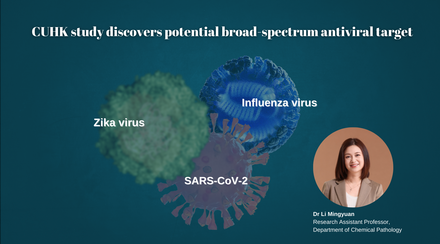CUHK Completes a 20,000-person Plasma DNA Screening Study of Nasopharyngeal Cancer, and Finds a Dramatic Shift to Early Stage Cancers
Press Conference Highlight
The Chinese University of Hong Kong (CUHK) recently completed a 20,000-person study and confirms that plasma Epstein-Barr virus (EBV) DNA analysis is useful for screening early asymptomatic nasopharyngeal carcinoma (NPC). By using this technology, NPC patients can be identified at significantly earlier stages, when there is a much greater likelihood of successful treatment. The landmark findings were released in the New England Journal of Medicine today.
80% Unscreened NPC Patients are Diagnosed at Advanced Stages
NPC is a common type of cancer in Hong Kong and in other parts of Southern China. It is one of the most aggressive head and neck cancers and frequently metastasizes to distant lymph nodes and organs. The incidence of this cancer is up to 35 per 100,000 in middle-aged men in endemic areas every year. According to the Hong Kong Cancer Registry, there are more than 800 new cases of NPC in Hong Kong every year.
As early NPC is relatively asymptomatic, approximately 80% of unscreened patients are diagnosed with advanced NPC, which is more difficult to treat than early stage NPC.
Screening NPC by Plasma EBV DNA Analysis
NPC is closely associated with infection by the EBV. The presence of plasma EBV DNA consisting of short DNA fragments released by NPC cells will help identify NPC patients.
More than 20,000 middle-aged Chinese males in Hong Kong without NPC symptoms were recruited between 2013 and 2016 to join the study and were screened with plasma EBV DNA analysis. Among them, 309 persons had persistently positive results on initial and follow-up tests and were invited for further investigation with nasal endoscopic examination and magnetic resonance imaging (MRI). Out of 300 participants who were willing to undertake further investigation, 34 were confirmed as having NPC.
Results of the study are summarized in the following table:
| Patients identified in the study | Historical Cohort in HK | |
| Proportion of Stage I/II Disease | 71% | 22% |
| 3-year Progression-free Survival | 97% | 70% |
The potential of the predictive value of the circulating DNA analysis for screening early cancers was further highlighted by events occurring in four participants. Three patients that screened positive did not find tumors in the initial endoscopic examination but then had tumors identified from MRI. In addition, a participant who screened positive but declined further investigation, was subsequently diagnosed with advanced-stage NPC at 32 months after enrolment to the study, and died 2 months later.
Based on the results of the study, Professor Allen CHAN, Professor, Department of Chemical Pathology, Faculty of Medicine at CUHK, elaborated that, “This study suggests non-invasive DNA screening strategy could potentially result in better outcomes for patients with NPC. The patients identified by screening were at significantly earlier stages. They could receive more timely and effective treatments which may improve the progression-free survival and reduce treatment-associated morbidity.”
Professor Dennis LO, Director of the Li Ka Shing Institute of Health Sciences at CUHK, known for his landmark discovery of the presence of cell-free fetal DNA in maternal plasma, has been working to apply circulating DNA analysis for screening early cancers. He remarked, “This study has demonstrated the potential of circulating DNA analysis for screening early NPC. Even small tumors could release sufficient amounts of tumor DNA into the blood to allow sensitive detection of very early cancers.”
Professor Lo added, “Considering the shift in stage distribution and potential for significant improvement in mortality and morbidity, NPC screening with EBV DNA analysis appears to be a feasible practice in regions with high incidence.”

The Chinese University of Hong Kong (CUHK) recently completed a 20,000-person study and confirms that plasma Epstein-Barr virus (EBV) DNA analysis is useful for screening early asymptomatic nasopharyngeal carcinoma (NPC). The findings have just been released in the New England Journal of Medicine. Featured are (right) Professor Dennis LO, Director of the Li Ka Shing Institute of Health Sciences at CUHK, and Professor Allen CHAN from the Department of Chemical Pathology, Faculty of Medicine at CUHK.

(Right) Professor Dennis LO, Director of the Li Ka Shing Institute of Health Sciences at CUHK, and Professor Allen CHAN from the Department of Chemical Pathology, Faculty of Medicine at CUHK.

Mr LO (right), who was asymptomatic, was diagnosed with NPC after he underwent the plasma EBV DNA test. He is grateful to the very early diagnosis so that he could have speedy recovery after radiotherapy.

Group photo of the research team for the Plasma DNA Screening Study of Nasopharyngeal Cancer.

The NPC screening study received a lot of support from many bodies. Featured are representatives of the research team with some of supporting parties, including Dr Hon Fernando CHEUNG, representative of the Labour Party (4th from left); Mr Christopher TSOI (4th from right), representative of the Democratic Party and Miss Sally POON, representative of the Liberal Party (3rd from right).

Representatives of the research team take a group photo with Dr Ken DRAZAN (3rd from right), President of GRAIL .

(2nd from left) Prof. Dennis LO remarks that even small NPC tumors could release sufficient amounts of DNA into the blood to allow sensitive detection of very early cancers.

Prof. Allen CHAN highlights that screening NPC by plasma EBV DNA analysis could help identify NPC patients at significantly earlier stages.













































































